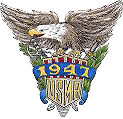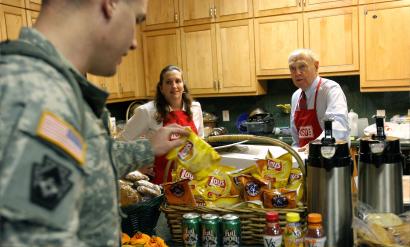'ONCE A SOLDIER, ALWAYS A SOLDIER'
By BO EMERSON
The Atlanta Journal-Constitution
Published on: 11/09/07
For retired Gen. Gordon "Duke" Duquemin, a career in the military has led to all sorts of heart-stopping adventures.
Riding
a crippled helicopter down till it crashed. Sprinting from the wreckage with a bullet hole in his leg. Going for sandwiches.
It's a recent sunny Wednesday, the last day in October. The general has secured the sandwiches, but he still must negotiate I-75 to deliver them to the troops.
"OK, mister, you can have the road," he says to an 18-wheeler moving into his lane with no room to spare. "I'm not going to argue with you."
On his way to feed soldiers at the USO Club at Hartsfield-Jackson International Airport, this decorated veteran of conflicts in Korea and Vietnam is unusually blithe about Atlanta traffic. That might be because he's used to it. He's put 122,000 miles on his Toyota Avalon in five years, partly by making this weekly round-trip from his house in Roswell, to a culinary school in east Cobb, to the airport and back home again.
Or it might be because he's already survived being peppered with shot and shell.
"Ever since I was a kid, I always wanted to be a soldier," says Duquemin, 83, who started this day in downtown Atlanta, breakfasting with members of the Kiwanis Club (he's the president) to plan a fund-raising event. He is pin-neat in blazer, charcoal slacks, blue shirt and immaculate red tie. "It intrigued me, the thrill of the battle, I guess. I didn't realize what actually went on there."
After a Milwaukee childhood and a commission from West Point, he found out for himself. Battle, he learned, is chaos, the sort of randomized violence depicted in "The Big Red One," a movie about the Army's 1st Infantry Division. Duquemin handled the chaos well and rose to command that division, becoming one of several in his class to make general.
Some ham from Bologna. When breakfast is over, the general navigates his way north to Cobb County and hails Michael Bologna, lead instructor of the culinary program at Chattahoochee Technical College. Bologna and his students have prepared 100 ham-and-cheese sandwiches, several trays of cookies and four chocolate cakes to feed the soldiers waiting for their flights back to Iraq and Afghanistan.
"You're not going to offer our guests a cookie?" asks fellow instructor Gary Slivenik.
"And take a cookie out of a soldier's mouth?" Bologna replies.
Properly chastened, Slivenik and company load the edibles into Duquemin's trunk, and he's off for the airport.
"Let's see what Neal Boortz has to say," Duquemin says, tuning in the conservative commentator's talk show. A news break prompts Duquemin to reflect on the stock market ("I missed a chance to get some of that Google stock"), politics ("This election is starting so early, it's got us worn out") and the Iraq war.
"I'm not so sure we're getting the whole story," says Duquemin, checking his side mirrors and merging onto the Downtown Connector. "Yesterday on ABC, for the first time ever, I saw some positive news." Security in Iraq is improved, he says. And the war will end, "eventually."
"We've been in Korea since 1945," he points out. "We're still there, with a division."
He was there, for the occupation and the war, where he saw one of his first USO tours. "You know who we need now?" he asks. "We need somebody like Bob Hope. I remember seeing him in Korea. He was great." Even better, he says, was Hope's colleague Cyd Charisse. "She was tall, graceful, and a fantastic dancer."
Such USO efforts really cheer up the troops, he says. What raises Duquemin's spirits, in the face of this current conflict, is the quality of the volunteer Army.
"I'm just impressed with these young people," he says, switching off the radio. "After being away for R and R, they want to get right back and see how their buddies are doing. They just don't get enough patting on the back."
In constant motion. As a longtime USO volunteer, he's been patting those backs almost continually since he retired in 1981. He's made this weekly sandwich run for about three years, or about 15,000 sandwiches. Other culinary schools, restaurants and clubs also contribute food to the USO effort, and other volunteers ferry them to the troops on other days.
"It's payback," the general says, pulling into short-term parking at Hartsfield-Jackson. "Once a soldier, always a soldier."
The former track star (he was captain of the team at the University of Wisconsin, where he also attended two years of college) seems to be in constant motion. He doesn't stand still on escalators; he climbs them. "Move it or lose it!" he says, threading through the airport crowd.
At the USO Club, he dons a red apron, part of his new uniform. His old one is in the permanent collection at Atlanta's National Museum of Patriotism, where he is a director, though some of the medals are wrong. It's easy to mix them up: He has a bunch, including a Distinguished Service award, three Silver Stars, a Legion of Merit and a Bronze Star.
He earned a Purple Heart flying west of Pleiku, near the Cambodian border, in the late 1960s. He saw the enemy shooter aiming at him shortly before bullets smashed his Bell helicopter's clear "bubble." One passed through his leg. The crippled helicopter auto-rotated down behind enemy lines, and Duquemin and the pilot hit the ground running, sprinting for cover.
Running with a bullet-hole in his leg, the ex-track man says, wasn't as bad as you might imagine: "It didn't hit the bone."
Making an impression.
At the airport, the young soldiers in battle dress, toting their rucksacks and queuing up in the atrium's second level, seem impressed to find a two-star general dishing out sandwiches. But they are also impressed with his upbeat cheer.
"You'd be amazed at who you run into in places like this," says Lt. Col. Greg Thompson of the 1st Cavalry, waiting for his flight to Baghdad. "Who knows? It could be me here at this USO someday, greeting soldiers."
Mary Lou Austin, president of the USO of Georgia, wearing a bright orange scarf and a pumpkin pin, says the soldiers get a kick out of meeting the general. His most attractive quality, she says, is that "he's a hard worker. He's not one to stand around and look good and get the glory. You give him a job and he'll do it."
And Duquemin has plenty of jobs.
Later on this Halloween afternoon, for instance, he will motor over to Fort McPherson to sift through the aftermath of the charity USO golf tournament he helps organize every October, packing up signs and bringing them home in his trunk.
But first he has a ceremonial duty to perform. A small American flag held high in his right hand, he leads 60 or so troops from the airport atrium to their departure concourse, where they are bound for the Middle East. Civilians waiting in the atrium stand and applaud as the soldiers pass by.
Good decision. No need to irritate the Duke, who once encountered an indifferent group of airport civilians. His barked orders to them were simple:
"Get off your duffs, stand up and clap."



